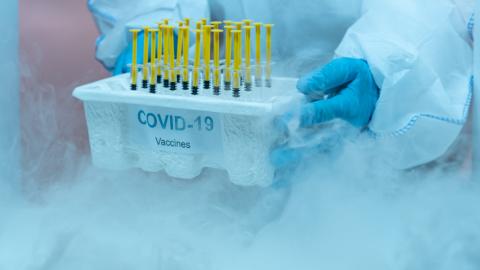
Contents
Which freezers are energy-efficient?
How much can energy-efficient ULT freezers save?
The life-changing COVID-19 vaccine needs to be stored at low and steady temperatures, which reduce biological activity and preserve the vaccine. Standard laboratory-grade freezers that maintain a temperature of –20°C will work for the Moderna and Johnson & Johnson vaccines. But the Pfizer vaccine requires a ULT freezer, which is commercial equipment that can maintain a temperature of –80°C.
The Centers for Disease Control and Prevention “requires vaccines to be stored in high-performance freezers that meet strict specifications, according to the Emerging Technologies Coordinating Council’s (ETCC’s) Ultra-Low Temperature Freezers: Opening the Door to Energy Savings in Laboratories.
These ULT freezers are effective but they consume a lot of energy. Fortunately, there are energy-efficient options that utilities can incentivize and promote to reduce energy consumption while helping communities store and distribute the COVID vaccines.
Which freezers are energy-efficient?
ENERGY STAR has a specification for laboratory-grade and ultralow temperature freezers. To qualify, ULT freezers need to consume a maximum of 0.55 kilowatt-hours (kWh) per day per cubic foot at –75°C. You can find ENERGY STAR Certified Lab Grade Refrigerators and Freezers on its Product Finder page, which lets you filter the units by temperature. The organization also has a specification for laboratory-grade refrigerators, which can safely house the Moderna and Johnson & Johnson vaccines.
The ETCC’s report and Southern California Edison’s In Search of Energy Efficiency Opportunities for Laboratory-Grade Freezers (PDF) explain that ENERGY STAR could improve its specification with more research. However, the current specification is the best efficiency standard to use in the short term for energy-efficient vaccine storage.
How much can energy-efficient ULT freezers save?
Because the high-efficiency freezers use about half the energy of standard models (figure 1), they’ll save users $219 and 2,555 kWh per year compared to standard equipment (figure 2). The best available units will save customers even more. The reports from ETCC and Southern California Edison explain that simply turning a ULT freezer up to –70°C from –80°C can reduce energy usage by 30% and prolong compressor life. For more information about the savings potential, see the California Electronic Technical Reference Manual (eTRM), which uses these reports to estimate savings for its Ultra-Low Temperature Freezer measure.
Figure 1: High-efficiency units use about half the energy of standard models
Figure 2: ENERGY STAR freezers will save customers $219 annually
| Performance metric | Best available equipment | ENERGY STAR equipment | Less efficient equipment |
|---|---|---|---|
| © E Source; data from US Department of Energy | |||
| Annual energy use (kilowatt-hours) | 2,646 | 4,745 | 7,300 |
| Annual energy cost ($) | 227 | 408 | 627 |
| Lifetime energy cost ($) | 2,005 | 3,596 | 5,532 |
| Lifetime energy cost savings | 3,527 | 1,936 | Not applicable |
How much do efficient ULT freezers cost?
We searched vendor websites and found that units range from about $7,000 to $30,000, but most cost between $12,000 and $18,000. For incremental cost, the ETCC study found that energy-efficient ULT freezers cost between $1,000 and $3,000 more than a standard model. The study also explains that prices vary a lot even among the same model from different purchasers and sellers.
Which companies manufacture ULT freezers?
According to ENERGY STAR’s Product Finder, the following manufacturers offer qualified ULT freezers:
- B Medical
- Binder
- Eppendorf
- Haier
- Liebherr
- Nuaire
- Panasonic
- PHCbi
- Phononic
- Stirling Ultracold
- Thermo Fisher
What utility programs exist for ULT freezers?
We’re aware of three active programs with incentives for ULT freezers.
Efficiency Works. The Business New Construction program that Efficiency Works administers for several Colorado utilities offers building owners $450 incentives for ULT freezers. Units must be ENERGY STAR–certified, operate at less than –70°C, and consume less than 0.42 kWh per day per cubic foot.
PG&E. The utility offers rebates to commercial customers for installing energy-efficient refrigeration measures in its Product Rebates. ENERGY STAR–certified ULT freezers are eligible for rebates of $300 (for 15 to 24 cubic feet) or $600 (for 24 to 29 cubic feet).
SDG&E. This utility’s Business Energy Solutions Program includes $600 incentives for ULT freezers greater than 24 cubic feet. These incentives are only available to business customers whose monthly electric demand didn’t exceed 200 kilowatts during the previous 12 months.

